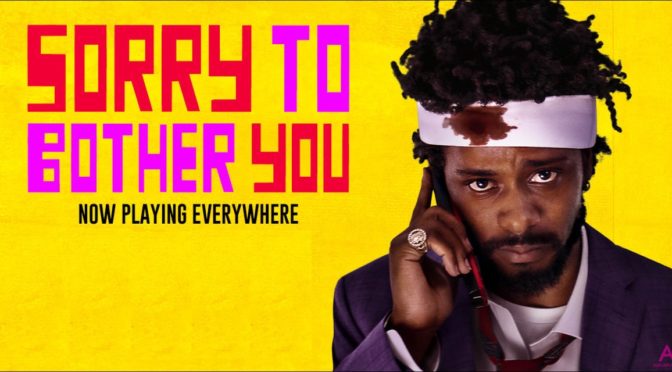If you wanted a wild and provocative take on a range of today’s issues, musician turned director Boots Riley has something for you. Struggling for money in Oakland, California, Cassius “Cash” Green (Lakeith Stanfield; Get Out) finds a job as a telemarketer. After a rough start, he gets the advice to use his “white voice” to rack up more sales. This leads to phenomenal success and he gets promoted to being a “power caller” with significantly higher pay. The change in his social status leads to conflict with his friends and family and the continued success forces him into contact with the CEO of a morally questionable company (Armie Hammer; The Social Network).
The miraculous nature of Sorry to Bother You is the smorgasbord of wide-ranging, serious topics it somehow addresses, all in its typically radical style. There are almost too many to detail here and their abundance should make the film feel unfocused, but it doesn’t. Instead, these issues are presented, and addressed, as they come up in daily life. They appear in one moment and disappear the next as another issue comes into view. This casual nature is reflective of Cash’s own life. He is faced with countless issues every day due to his station in life and can only deal with them as needed before being faced with another.

The cast is up to challenge of Riley’s eccentric world with Stanfield and Hammer leading the team. Cash begins the film jaded by a limited life with a chip on his shoulder as he walks into the room. Initially, his defensive attitude can be grating, but during his rapid ascent Stanfield gives Cash the right blend of awe and eventually disgust at the decadence of the ultra-rich. And when it comes to playing the ultra-rich, Hammer is perfectly cast as the head of a company that offers minimal food and lodging in exchange for a lifetime of servitude. He reeks of entitled, upper-class privilege and is the epitome of a millennial WASP. Although his actions may seem welcoming to Cash, his sinister motivation is cold, corporate greed and Hammer brings credibility even when his character’s ideas become outrageous.
There are a lot of labels that could be used to describe Riley’s take on the amalgamation of issues presented. His style is at times surrealist, satirical, and even farcical just to name a few, yet he manages to maintain a consistent perspective amidst the shifting tones. The through line in his style is an anarchic spirit. No matter how he does it, Riley is interested in assaulting the accepted norms of daily life and exposing them for their true perversion. Where a director like David Lynch (Blue Velvet) creates uncannily similar worlds to recast the normal as abnormal, Riley instead amplifies existing aspects to the extreme. The suppression of racial identity is shown as total conversion to the majority through Cash’s nasally Caucasian impression, the stupidity of mass entertainment is represented in a show based solely on people being physically abused, and the impact of internet meme culture is shown through a 10 second clip creating a widespread consumer products line. Just when it seems Riley has exhausted his sources, the third act introduces an element that takes the dehumanization of the working class to an absolutely bonkers level. Yet, within the film’s chambers of oddities, these outlandish details are acceptable and double as an indictment of our modern society. Riley takes an irreverent swing at today’s issues that, in an increasingly strange and unequal world, is just the kind of crazy we need.

4/5 stars.
